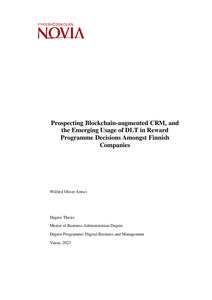Prospecting Blockchain-augmented CRM, and the Emerging Usage of DLT in Reward Programme Decisions Amongst Finnish Companies
Antwi, Wilfred Oliver (2023)
Antwi, Wilfred Oliver
2023
All rights reserved. This publication is copyrighted. You may download, display and print it for Your own personal use. Commercial use is prohibited.
Julkaisun pysyvä osoite on
https://urn.fi/URN:NBN:fi:amk-2023120835358
https://urn.fi/URN:NBN:fi:amk-2023120835358
Tiivistelmä
To create and appropriate value firms must know the depths of their customer needs, purchasing attitudes, and activities through data. Customer Relationship Management (CRM/E-CRM) is a crucial part of ERP software platforms in this regard. It is responsible for customer data records keeping from multiple channels for Analytical, Operational, Collaborative, Strategic, and Reward Programmes purposes. Firms’ strategies could be only as good as their CRM/E-CRM data coupled with other innovative measures to accelerate retention while growing profit. To keep data secured while rewarding customers most innovatively, the capabilities of Distributed Ledger Technology including Blockchain are scouted and prospected in this research as a general objective.
This research aimed to explore and propose Blockchain-augmented CRM/E-CRM and its usage in Loyalty Programme (LP) decisions in Finnish companies using the Mixed method. As an Exploratory approach, it ascertained the extent to which Finnish companies rely on CRMs/E-CRM for database marketing decisions, including loyalty programmes. It examined challenges associated with current CRM/E-CRM systems and proposed Blockchain solutions. Finally, it prospects Blockchain and Web 3.0 technology usage in partnerships and multi-firm loyalty programs. It was hypothesised that functional connection customers who are mainly disloyal could be targeted with the appropriate CRM-driven-data LP to make them buy again. From the organisational perspective, Blockchain experts working in this direction, and CRM database marketing experts were targeted with Likert scale survey questions and in-depth interviews for data collection purposes.
Findings showed that Blockchain-augmented CRM could harbour better advantages especially the Public-Permissioned type where singular data harvesting and deletion, single manipulation, deliberately restricted access, and hacks as part of current CRM problems could be thwarted. Blockchain could also enhance data warehouse immutability, secure decentralised departmental/company-wide shared CRM/E-CRM access, promote Single Sign-On (SSO) into a firm’s applications and systems, all to augment informed decision-making, especially for Salesforce, and Dynamic 365 users. Moreover, Blockchain features of tokenisation, smart contracts, transparency and transferrable points, reduced transaction cost, influencer and affiliate marketing codes, and delivery tracking are being used in Web 3.0 dApps, to augment business decisions. Finland is mildly in on all these prowess of DLT. These prospects of Blockchain have moved beyond use cases and are heading towards scalability. However, further research is needed on its cost-effectiveness, and its adoption.
This research aimed to explore and propose Blockchain-augmented CRM/E-CRM and its usage in Loyalty Programme (LP) decisions in Finnish companies using the Mixed method. As an Exploratory approach, it ascertained the extent to which Finnish companies rely on CRMs/E-CRM for database marketing decisions, including loyalty programmes. It examined challenges associated with current CRM/E-CRM systems and proposed Blockchain solutions. Finally, it prospects Blockchain and Web 3.0 technology usage in partnerships and multi-firm loyalty programs. It was hypothesised that functional connection customers who are mainly disloyal could be targeted with the appropriate CRM-driven-data LP to make them buy again. From the organisational perspective, Blockchain experts working in this direction, and CRM database marketing experts were targeted with Likert scale survey questions and in-depth interviews for data collection purposes.
Findings showed that Blockchain-augmented CRM could harbour better advantages especially the Public-Permissioned type where singular data harvesting and deletion, single manipulation, deliberately restricted access, and hacks as part of current CRM problems could be thwarted. Blockchain could also enhance data warehouse immutability, secure decentralised departmental/company-wide shared CRM/E-CRM access, promote Single Sign-On (SSO) into a firm’s applications and systems, all to augment informed decision-making, especially for Salesforce, and Dynamic 365 users. Moreover, Blockchain features of tokenisation, smart contracts, transparency and transferrable points, reduced transaction cost, influencer and affiliate marketing codes, and delivery tracking are being used in Web 3.0 dApps, to augment business decisions. Finland is mildly in on all these prowess of DLT. These prospects of Blockchain have moved beyond use cases and are heading towards scalability. However, further research is needed on its cost-effectiveness, and its adoption.
